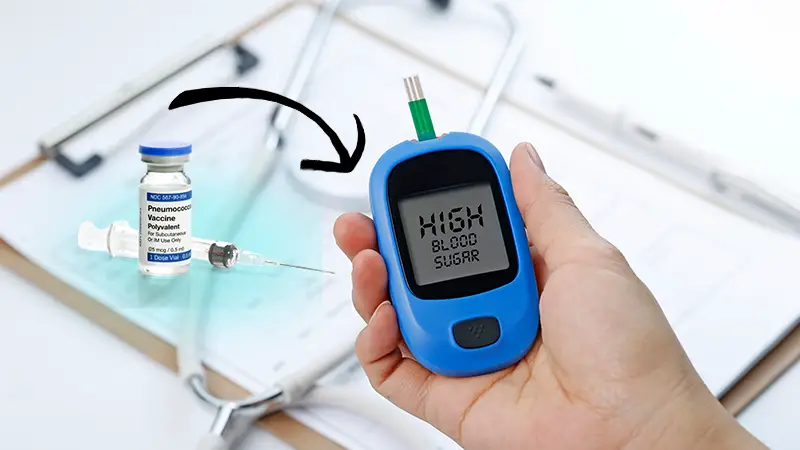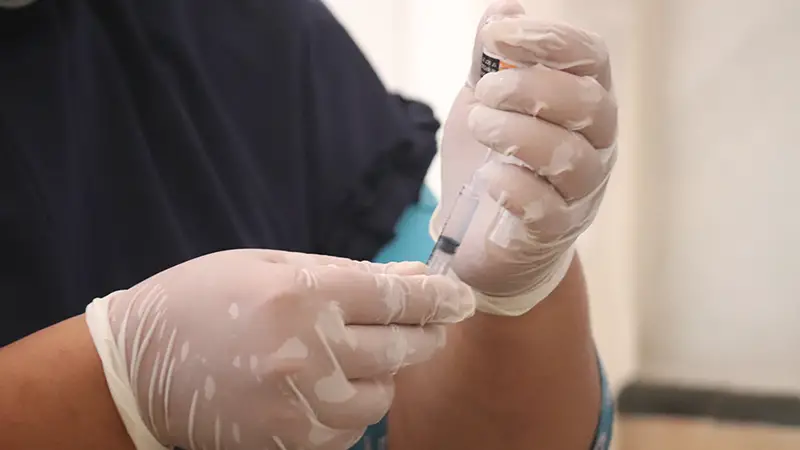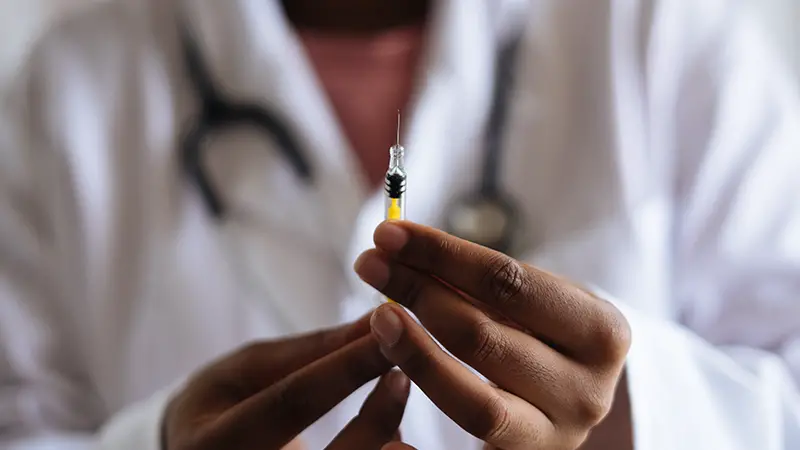The pneumonia vaccine, a crucial tool in preventing pneumococcal infections, is generally considered safe and effective. However, questions have arisen regarding its potential impact on blood sugar levels.
For individuals with diabetes or concerns about blood sugar regulation, it’s essential to understand if can pneumonia vaccine raise blood sugar.
While the vaccine is primarily designed to bolster the immune system’s defense against specific bacteria, there have been reports of transient blood sugar elevation following vaccination.
This has raised curiosity and concern, particularly among those with diabetes who strive to maintain precise blood sugar control.
This discussion delves into the connection between the pneumonia vaccine and blood sugar levels, exploring the possible reasons behind this phenomenon and offering insights for individuals seeking to make informed decisions regarding vaccination.
Can Pneumonia Vaccine Raise Blood Sugar?
The pneumonia vaccine, whether it’s the pneumococcal polysaccharide vaccine (PPSV23) or the pneumococcal conjugate vaccine (PCV13), is generally considered safe and effective in preventing pneumococcal infections.
However, there have been some reports of individuals experiencing elevated blood sugar levels after receiving the vaccine.
The reason behind this potential rise in blood sugar is not fully understood, and it’s not a common or well-documented side effect of the pneumonia vaccine. There may be several factors at play, including the body’s immune response to the vaccine.
When the immune system is activated to build immunity against the bacteria targeted by the vaccine, it can release stress hormones like cortisol and cytokines. These hormones can temporarily raise blood sugar levels.
It’s important to note that any increase in blood sugar levels following a pneumonia vaccine is typically short-lived and not a cause for significant concern, especially in individuals without diabetes or pre-existing blood sugar control issues.
However, if you have diabetes or are otherwise concerned about how the vaccine might affect your blood sugar, it’s advisable to discuss this with your healthcare provider.
They can provide guidance on monitoring your blood sugar and managing any potential fluctuations after vaccination.
Why Does Pneumonia Raise Blood Sugar?

The reasons behind a pneumonia vaccine potentially causing a rise in blood sugar levels are not yet fully elucidated, and this phenomenon is not a common or well-documented side effect.
Nevertheless, there are several factors that could contribute to this occurrence:
Immune Response
When the body is exposed to the pneumonia vaccine, it triggers an immune response to build immunity against the targeted bacteria. This response can release stress hormones, such as cortisol, which can temporarily elevate blood sugar levels.
Inflammation
The immune response also involves the production of cytokines, which are signaling molecules that regulate inflammation. Elevated levels of cytokines can impact insulin sensitivity and lead to higher blood sugar levels.
Stress Response
The immune system’s activation can induce a stress response in the body, which releases additional glucose into the bloodstream to provide energy for the immune response. This can result in temporary hyperglycemia.
Individual Variability
People react differently to vaccines, and individual variations in immune responses and hormonal reactions can influence blood sugar levels.
Underlying Health Conditions
Individuals with pre-existing conditions like diabetes may be more susceptible to fluctuations in blood sugar levels due to the immune response triggered by the vaccine.
Medication Interactions
Medications taken by the individual, such as corticosteroids, which can influence blood sugar levels, may interact with the vaccine’s effects.
Vaccine Type
The two primary pneumonia vaccines, PPSV23 and PCV13, can have differing effects on the immune system, potentially leading to variations in blood sugar responses.
Timing of Vaccination
Blood sugar fluctuations can be influenced by the timing of the vaccination, other meals, or medications taken around the same time.
Stress and Anxiety
The anxiety or stress associated with receiving a vaccine can itself lead to transient blood sugar elevations, particularly in individuals with diabetes.
It’s important to reiterate that any increase in blood sugar levels after a pneumonia vaccine is usually short-lived and should not be a cause for significant concern, especially in individuals without pre-existing blood sugar control issues.
However, those with diabetes or other blood sugar-related concerns should discuss this with their healthcare provider for personalized guidance on monitoring and managing any potential fluctuations.
What Are The Common Side Effects Of The Pneumonia Vaccine?

The pneumonia vaccine, either the pneumococcal polysaccharide vaccine (PPSV23) or the pneumococcal conjugate vaccine (PCV13), is generally safe and effective. However, like all vaccines, it can cause side effects in some individuals.
Here are some common side effects:
Pain, Redness, or Swelling at the Injection Site
Many people experience mild pain, redness, or swelling at the site of the injection. These symptoms are usually mild and subside on their own after a few days. Applying a cold compress to the injection site can help alleviate discomfort.
Fatigue and Mild Fever
Some individuals might feel tired or develop a mild fever after getting the pneumonia vaccine. This is the body’s natural response to the vaccine, indicating that the immune system is building protection against the bacteria. Resting and staying hydrated can help manage these symptoms.
Muscle Aches and Joint Pain
Muscle aches and joint pain are common side effects. These symptoms are usually mild and temporary, resolving within a few days. Over-the-counter pain relievers and adequate rest can provide relief.
Headache
Headaches are a common side effect of many vaccines, including the pneumonia vaccine. Drinking plenty of water and taking over-the-counter pain medications, if approved by a healthcare provider, can help alleviate headaches.
Nausea
Some individuals may experience mild nausea after receiving the pneumonia vaccine. Eating a light meal before vaccination and avoiding heavy or greasy foods afterward can help minimize this symptom.
Chills or Sweating
Chills or excessive sweating can occur as the body reacts to the vaccine. These symptoms are generally short-lived and can be managed by dressing in layers to adjust body temperature.
Dizziness
Feeling lightheaded or dizzy can happen after vaccination. It’s important to sit or lie down for a few minutes after the injection to prevent falls. If dizziness persists or worsens, seeking medical attention is advisable.
Allergic Reactions
Although rare, allergic reactions to the pneumonia vaccine can occur. Signs of a severe allergic reaction may include hives, swelling of the face and throat, difficulty breathing, and a rapid heartbeat. If these symptoms occur, immediate medical attention is necessary.
Localized Lumps
Some individuals might develop localized lumps or nodules at the injection site. These are typically harmless and resolve on their own without treatment.
While these side effects are common and usually mild, it’s essential to report any unusual or severe reactions to a healthcare provider.
Most people tolerate the pneumonia vaccine well, and the benefits of vaccination in preventing serious pneumococcal infections often outweigh the risks of these temporary side effects.
Precautions Of The Pneumonia Vaccine

The pneumonia vaccine is generally safe and effective, but certain precautions should be considered, especially for individuals with specific medical conditions or situations.
Here are some precautions to keep in mind:
Allergies to Vaccine Components
If you have a known allergy to any component of the pneumonia vaccine, it’s essential to inform your healthcare provider before vaccination. They can consider alternative vaccines or take appropriate measures to manage allergic reactions.
Pregnancy and Breastfeeding
While the pneumonia vaccine is generally safe for pregnant and breastfeeding women, it’s essential to discuss it with your healthcare provider. They can assess your specific situation and recommend the appropriate timing for vaccination.
Immunocompromised Conditions
Individuals with weakened immune systems due to conditions like HIV/AIDS, cancer, or immunosuppressive treatments may need special consideration for the pneumonia vaccine.
Discuss the timing and type of vaccine with your healthcare provider to ensure the most effective protection.
Previous Vaccine Reactions
If you’ve had a severe reaction to a pneumonia vaccine or experienced significant side effects in the past, inform your healthcare provider. They can help determine the best course of action, such as an alternative vaccine or a modified vaccination schedule.
Recent Vaccinations
If you’ve recently received other vaccines, it’s advisable to consult your healthcare provider before getting the pneumonia vaccine. They can help determine the ideal timing and spacing between vaccinations.
Fever or Illness
If you have a fever or are acutely ill on the scheduled vaccination day, it’s best to postpone the pneumonia vaccine until you’ve recovered. Vaccination during illness may not be as effective, and it’s safer to wait until you’re in better health.
Age and Vaccine Type
The pneumonia vaccine is available in two types, PPSV23 and PCV13, each recommended for specific age groups and medical conditions. It’s essential to consult with your healthcare provider to ensure you receive the appropriate vaccine type and schedule based on your age and health status.
Discussing these precautions with your healthcare provider ensures that the pneumonia vaccine is administered safely and effectively, tailored to your individual needs and circumstances.
It helps maximize the vaccine’s protective benefits while minimizing potential risks or complications.
FAQs
Can the pneumonia vaccine cause a rise in blood sugar levels?
Yes, there have been reports of individuals experiencing temporary increases in blood sugar levels after receiving the pneumonia vaccine. This phenomenon is not common, but it can occur, particularly in individuals with diabetes or those prone to blood sugar fluctuations.
How does the pneumonia vaccine impact blood sugar levels?
The exact mechanisms behind blood sugar elevation after the pneumonia vaccine are not fully understood. It may be related to the body’s immune response, stress hormone release, or inflammation triggered by the vaccine.
Is the blood sugar increase following the pneumonia vaccine significant?
The blood sugar increase is typically short-lived and not significant enough to cause alarm. It’s generally manageable and doesn’t pose a serious risk to health.
Are there specific groups at higher risk for blood sugar elevation after the pneumonia vaccine?
Individuals with diabetes or those with pre-existing blood sugar control issues may be more susceptible to blood sugar fluctuations after vaccination. It’s essential for these individuals to monitor their blood sugar levels and consult with a healthcare provider as needed.
Should I still get the pneumonia vaccine if I have concerns about my blood sugar levels?
Yes, for most individuals, the benefits of the pneumonia vaccine in preventing serious pneumococcal infections far outweigh the potential, short-lived blood sugar elevation.
If you have concerns about your blood sugar, discussing the vaccination with your healthcare provider can help address these concerns and ensure you receive the vaccine safely and effectively.
Conclusion
The relationship between the pneumonia vaccine and blood sugar levels is a topic of interest and consideration for many, especially individuals with diabetes.
While it’s not a common or well-documented side effect, some factors, including the immune response, stress hormones, and inflammation, can lead to temporary blood sugar elevation following vaccination.
However, this increase is typically short-lived and should not deter individuals from getting vaccinated, given the vaccine’s vital role in preventing serious pneumococcal infections.
For those with concerns about blood sugar management, consulting with a healthcare provider is essential. They can provide guidance on monitoring and addressing any potential fluctuations and ensure that vaccination remains a safe and effective tool in safeguarding health.
Hi, I’m Mark Pattinson and I’m a freelance personal trainer. I’ve been working in the fitness industry for over 10 years especially since I work with diabetes patients and I love helping people achieve their fitness goals. I believe that everyone can benefit from a good workout, and I’ll do everything to make sure you get the most out of your training.